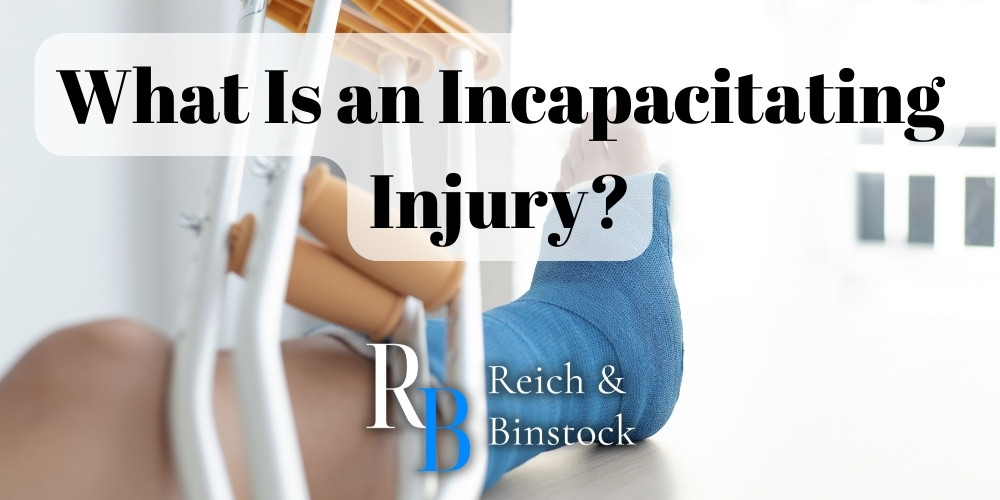According to the Texas Department of Transportation, an incapacitating injury is “any injury, other than a fatal injury, which prevents the injured person from walking, driving, or normally continuing the activities they were capable of performing before the injury occurred.” Severe injuries tend to fall under the umbrella term of incapacitating injuries, as do catastrophic injuries. Oftentimes, it takes months to recover from an incapacitating injury, if not longer. Accident victims who suffer these injuries deserve compensation through a personal injury claim.
At Reich & Binstock, our Houston personal injury lawyers are here to help you fight for your legal right to just compensation. If you have suffered a severe injury due to someone else’s negligence, you have the right to file a personal injury lawsuit. Our attorneys will help you gather evidence to support your claim, negotiate with the insurance company on your behalf, and go to trial if necessary. To schedule a free consultation with us, please call our office at 713-622-7271 today.
What Is the KABCO Scale?
The KABCO injury scale is used by the Federal Highway Administration (FHWA) to measure the severity of motor vehicle accident injuries, as well as how those injuries impact the costs. Most motor vehicle crash cases involve some degree of financial loss. However, when a crash involves a serious injury or fatality rather than a minor injury, those costs increase significantly.
If you are an accident victim who has suffered a serious injury from the accident, the KABCO scale may affect the financial compensation you receive. When law enforcement officers respond to the scene, they will assign one of the following ratings to the accident.
- K: Someone was killed at the crash scene.
- A: Someone suffered incapacitating injuries requiring medical care transport or hospitalization. Examples include amputations, broken or distorted limbs, or a crushed chest.
- B: There is an evident injury, but it is non-incapacitating in nature. Examples include minor injuries, such as minor lacerations or bruises.
- C: Someone has suffered a possible injury.
- O: Law enforcement has observed no apparent injuries from the scene of the crash.
Why Is the KABCO Scale Relevant in Personal Injury Claims?
If you have been involved in a Houston car accident, the KABCO rating assigned to your accident can act as strong evidence in a personal injury claim. For example, if you suffered serious internal injuries that required immediate medical attention, law enforcement will likely assign an “A” rating to the crash. This means that you suffered an incapacitating injury, which will generally yield a higher payout than a minor injury.
What Are Incapacitating Injuries?

Incapacitating injuries are those which are evident at the scene of the crash, but not fatal. Even though something is considered a non-fatal injury, it can still heavily impact your life. An officer may report a suspected serious injury at first, but once you receive medical treatment, we can determine your true injury severity. Additionally, incapacitating injuries can turn into fatal injuries without prompt medical treatment.
What Are Some Examples of Incapacitating Injuries?
Motor vehicle crash victims who suffer any of the following injuries have technically suffered incapacitating injuries.
- Neck injuries
- Severe cuts and lacerations
- Whiplash
- Chest injuries
- Head injuries
- Disfigurement
- Back and spinal cord injuries
- Paralysis
- Broken bones
- Nerve damages
- Any other type of injury reported that prevents someone from performing the normal activities they were able to perform before the crash.
Even some of the most common broken bones in car accidents can incapacitate crash victims. Many victims of incapacitating injuries also have the right to file a catastrophic injury claim. This is because they often suffer from lifelong complications, disability, or lost quality of life. We recommend speaking with a catastrophic injury lawyer about your case.
What Is a Non-Incapacitating Injury?
A non-incapacitating injury is one in which the injured person has suffered significant harm, but not to the extent that it disables them once they have recovered.
What Are Some Examples of Non-Incapacitating Injuries?
Examples of non-incapacitating injuries include the following.
- Minor lacerations and cuts
- Bruises
- Strained or sprained muscles
- Dislocated joints
- Abrasions or road rash
- Minor concussions
- Minor scarring
- Other injuries to the body that don’t impair the victim very much, if at all.
Keep in mind that an injured person with mild injuries will still need medical treatment. This leads to expensive medical bills that many people are not financially prepared to handle. They may also miss multiple days of work, which can result in lost wages and further financial strain. As the injured person, you have the right to file a claim for the pain and other losses you sustained from the accident.
What Are Possible Injuries?
A possible injury is also included on the KABCO scale. In other words, the reporting officer suspects an injury based on claims, reports, or behaviors rather than visible injuries. Certain other states may define this as a suspected serious injury.
Examples of Possible Injuries
Examples of a possible injury include the following.
- Limping
- Unconsciousness
- Minor whiplash
- Internal injuries
- Minor head injuries
Depending on the specific circumstances of auto accidents, possible injuries could very easily become incapacitating injuries. This is especially true if the victim does not seek a proper medical evaluation after the accident. Many people feel a rush of adrenaline during car accidents that prevents them from feeling the full extent of their injuries. Once that rush wears off, however, the pain will quickly set in.
What Is a Fatal Injury?

Fatal injuries are those which are severe enough to result in the death of the injured person. Generally, crashes are considered fatal if someone dies within 30 days of the crash. Although the victim has passed away, their family members have the right to file a wrongful death claim against the responsible party. The wrongful death attorneys at Reich & Binstock will investigate your claim and help you determine the best course of action.
What Causes Incapacitating Injuries?
Certain types of personal injury claims result in more incapacitating injury claims than others. However, the single most common culprit for incapacitating injuries is motor vehicle crash claims. Although someone can sustain an incapacitating injury from nearly any kind of accident, the following are the most common causes of incapacitating injuries.
- Motor vehicle accidents
- Commercial vehicle accidents
- Construction accidents
- Medical malpractice
- Toxic exposure
- Slip and fall accidents
- Nursing home falls
- Defective product cases
- Pedestrian accidents
- Boat accidents
Remember that an incapacitating injury can happen at nearly any time and in nearly any situation if negligence is involved. If you sustained an injury in one of the above types of accidents, you might be able to seek compensation for your impairment.
How to Prove Liability for an Incapacitating Injury
Depending on the state where the injury occurred, the consequences of an incapacitating injury may differ. In Texas, we have what is called a modified comparative fault system. This means that whoever is determined to be at fault for the accident will be held liable for the damages. Depending on their coverage levels, they will either compensate the victims through their insurance company or out of their own pockets.
It’s also important to remember that, because Texas is a modified comparative fault state, those who are found to be 51% or more at fault for the accident are barred from seeking compensation. Therefore, if someone breaks their leg in an accident and is found to be 60% at fault, they cannot seek damages from the other driver. If you are unsure of whether you have a valid claim, don’t hesitate to reach out to our Houston car accident attorneys. We will evaluate the specifics of your case and give you advice on how to proceed.
Compensation for Incapacitating Injuries

If an insurance company offers you a lowball settlement, or if their offer simply doesn’t cover your expenses from the crash, you may be able to file a personal injury lawsuit. Depending on a number of factors, the amount of compensation you can receive may vary. Below, we list the various types of compensation that you may qualify for after a crash.
- Current and future medical bills
- Property damage
- Lost income
- Loss of earning capacity
- Temporary or permanent disability
- Pain and suffering
- Emotional distress
- Loss of consortium
- Disfigurement or scarring
- Burial and funeral expenses if you lost a loved one in a crash
Contact a Houston Personal Injury Lawyer with Reich & Binstock
If you or someone you love has been injured in a car accident in Houston, the auto accident lawyers at Reich & Binstock are here to evaluate your claim, gather evidence to build your case, and fight for your right to just compensation. With our help, you can focus solely on your recovery while we do all the heavy lifting. We understand how frustrating it can be to handle an accident claim while your health isn’t the best. That’s why our legal team’s compassion and experience will work in your favor. You handle the recovery and we’ll handle the claim. To schedule a free consultation with a personal injury lawyer, please call our office at 713-622-7271 today.













